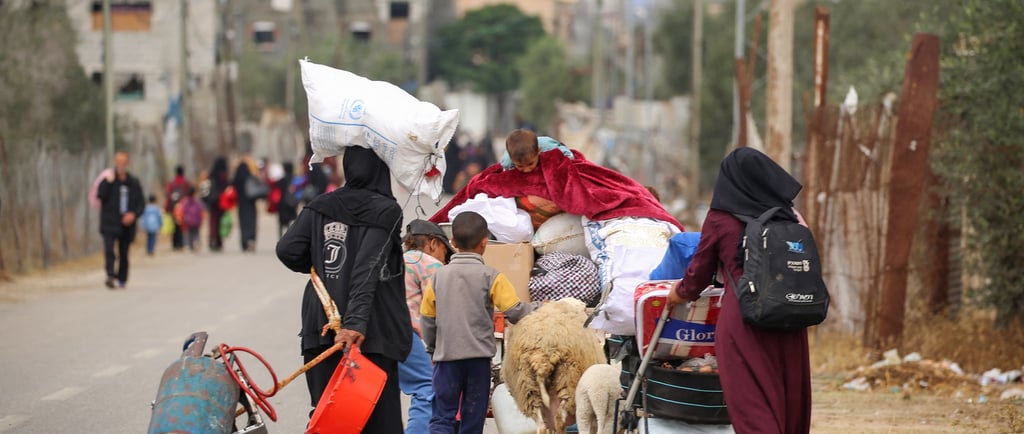Somaliland, Puntland, and Morocco: Examining the Feasibility of US Gaza Displacement Proposals
African Narratives examines feasibility of Trump's plan,, which suggesting relocating Gazans to various countries, including Egypt, Jordan, Somaliland, Puntland, Morocco
Kawthar Ahmed, Political Science Researcher
2/15/20253 min read


Following the recent escalation of violence in Gaza, speculation has resurfaced regarding previous proposals to displace residents of the Gaza Strip. A new study from African Narratives Think Tank critically examines the feasibility of a plan, initially put forward by US President Donald Trump, which suggested relocating Gazans to various countries, including Egypt, Jordan, Somaliland, Puntland, and Morocco.
The Trump administration presented this proposal as part of an initiative to redevelop Gaza as a tourist destination. However, it was widely condemned by Arab nations and the international community, who viewed it as an attempt to dismantle the Palestinian cause and fundamentally reshape the region's demographic and political landscape.
Authored by Political Science Researcher Kawthar Ahmed, the study highlights the key challenges and ultimate unfeasibility of implementing such a plan, particularly in the context of Somaliland, Puntland, and Morocco.
Key Findings: A Summary
The study's main points include:
Analysis of Trump's proposal to displace Gaza residents to countries including Somaliland, Puntland, and Morocco.
Highlighting the widespread Arab and international rejection of the plan, seen as a form of ethnic cleansing.
Examining the evolving relationship between the United States and Somaliland and its role in US strategy in the Horn of Africa.
Assessing the proposal to relocate the US military base from Djibouti to Somaliland and the associated challenges.
Detailing the significant obstacles to displacing Gaza residents to Somaliland, including Arab rejection, weak infrastructure, and security concerns.
Reinforcing the overall unfeasibility of implementing Trump's proposals to displace Gaza residents to Somaliland, Puntland, or Morocco.
Emphasising the urgent need to prioritise rebuilding Gaza as a sustainable solution to the crisis.
The "Alternative Homeland" Concept: A Historical Context
The report delves into the history of the "alternative homeland" concept, noting how Israel has historically sought to control land and displace the Palestinian population. It emphasises that the Palestinian national project's success hinges on the resilience of the Palestinian people on their land and the establishment of their political and national identity.
Ahmed writes, "Since the conflict's inception, Israel has strived to seize Palestinian land, uproot its inhabitants, and displace them through various methods. The Palestinian people, however, have remained steadfast despite the pressures."
Following the Al-Aqsa Flood Movement on October 7, 2023, discussions between the United States and Israel regarding potential displacement to Egypt and Jordan arose. When these proposals met with Arab rejection, the some media reports said that United States expanded its list to include Somaliland, Puntland, and Morocco.
US-Somaliland Relations: Strategic Interests and Geopolitical Competition
The study explores the growing relationship between the United States and Somaliland (unrecognized breakaway region in Somalia), noting Washington's increasing interest in strengthening ties with the region despite its lack of official recognition. This interest stems from US strategic objectives in the Horn of Africa, particularly amidst growing international competition from China and Russia.
The report also examines the possibility of relocating the US military base from Djibouti to Somaliland, highlighting both the potential opportunities and challenges. While such a move could offer operational advantages, it also faces significant hurdles related to security, infrastructure, and political stability.
Obstacles to Displacement: The Realities on the Ground
The core of the study focuses on the practical and political barriers to displacing Gaza residents to Somaliland, Puntland, and Morocco. These include:
Arab Rejection: Any attempt to displace Palestinians would be met with strong opposition from Arab nations, undermining the Palestinian cause.
Gazan Determination: The people of Gaza have consistently rejected the idea of displacement, reaffirming their commitment to their homeland.
Capacity Constraints: Somaliland and Puntland both face significant challenges in providing the necessary infrastructure and basic services to accommodate a large influx of refugees.
Security Concerns: The fragile security situation in Somalia, including the threat from groups like Al-Shabaab, raises serious concerns about the safety of displaced populations.
Political Instability: A large influx of refugees could exacerbate political tensions and potentially lead to social unrest.
Official Political Rejection: Both the Puntland and Moroccan governments have publicly rejected the notion of receiving Palestinian refugees.
Conclusion: A Call for Sustainable Solutions
The study concludes that implementing proposals to displace Gaza residents to Somaliland, Puntland, or Morocco is unrealistic and ultimately counterproductive. It argues that the focus should instead be on rebuilding Gaza and pursuing political solutions that guarantee the rights of the Palestinian people and the establishment of an independent Palestinian state.
"Despite the forceful statements made by US President Donald Trump and his insistence on implementing a plan to displace the residents of Gaza, this proposal remains fraught with numerous challenges and obstacles," the report concludes.
Download the full study here
Empowerment
Amplifying African voices for sustainable progress together.
Contact US
Growth
Street No. 3281, N'Djamena, Republic of Chad.
© 2024. All rights reserved.